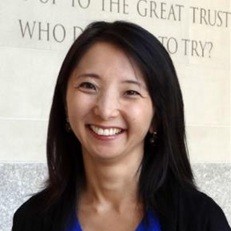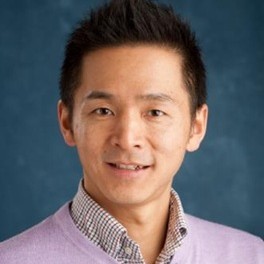日米次世代パブリック・インテレクチュアル・ネットワーク・プログラム第3期プログラム(2014-2016)フェロー一覧
※所属・肩書はプログラム参加時点

Liv Coleman is associate professor of political science at the University of Tampa, where she teaches East Asian comparative politics and international relations. Her research interests include Japanese gender politics and family policy responses to the declining birthrate, as well as Internet governance and processes of change in international organization. Dr. Coleman received her PhD in political science from the University of Wisconsin, Madison and her BA from Smith College. She conducted doctoral dissertation research as a visiting scholar at the University of Tokyo’s Institute of Social Science. She was also an advanced research fellow in the Program on U.S.-Japan Relations at Harvard University.

Shinju Fujihira is Executive Director, Program on U.S.-Japan Relations, Weatherhead Center for International Affairs, Harvard University. At the WCFIA, he has been a National Security Fellow at the John M. Olin Institute for Strategic Studies and an Advanced Research Fellow at the Program on U.S.-Japan Relations. His research has examined the role of finance in great power competition, Japan- China relations, and Japan’s diplomacy in East Asia. He is the author of “Can Japanese Democracy Cope with China’s Rise?” (2013) in Clash of National Identities and “Legacies of the Abe Administration” (2008) in Japan’s Political Mess (both published by the Asia Program, Woodrow Wilson International Center for Scholars) “From Shenyang to Pyongyang: Japan’s Diplomatic Trials in Northeast Asia” (Harvard Asia Quarterly, Autumn 2002); and his interview on Japan’s partisan conflict and foreign policy has appeared in the Asahi Shimbun. Prior to his current position, he was an assistant professor of political science at Tufts University. He received his BA in government from Cornell University, and PhD in politics from Princeton University.

Benjamin Goldberg is a Japan analyst at the State Department’s Bureau of Intelligence and Research. He focuses on issues such as Japan’s internal political situation, Japanese foreign policy, and regional economic and diplomatic activities. Previously, he served as a Foreign Media Analyst in the Media Reaction branch of the Office of Research in the Bureau of Intelligence and Research. In this position, he served as the primary editor and drafter of the Early Report, a daily analysis of global media reaction to major international events. Before joining the State Department, he worked as Analytical Director for an independent consulting company, Intellibridge Corp., as well as a junior reporter for the Washington bureau of Japan’s second-largest newspaper, the Asahi Shimbun. He graduated from Haverford College in 1995 with a BA in East Asian Studies and is competent in Japanese and Spanish.

Shihoko Goto Senior Fellow, The Maureen and Mike Mansfield Foundation. She has served as Director of the Indo-Pacific Program at the Wilson Center. Her research focuses on the economics and politics of Japan, Taiwan, and South Korea, as well as U.S. policy in Northeast Asia. She is also a contributing editor at The Globalist magazine. Prior to joining the Wilson Center, she was a journalist writing about the international political economy. As a correspondent for Dow Jones News Service and United Press International based in Tokyo and Washington, she reported extensively on policies impacting the global financial system as well as international trade. She was also formerly a donor country relations officer at the World Bank. She received the Freeman Foundation’s Jefferson journalism fellowship at the East-West Center and the John S. and James L. Knight Foundation’s journalism fellowship for the Salzburg Global Seminar. She received an MA in international political theory from Waseda University’s Graduate School of Political Science and a BA in modern history from Trinity College, University of Oxford.

Tobias Harris is senior fellow for Asia at the Center for American Progress, with a portfolio that includes Japan, the Korean Peninsula, and broader Asia. His analysis of Japanese politics appears regularly in publications like the Financial Times, Wall Street Journal Asia, and Foreign Policy and he has provided on-air analysis for CNBC, Bloomberg, NHK, and Al Jazeera International. Prior to his current position, he was an analyst of Japanese politics and economics at Teneo Intelligence, a political risk firm, as well as an Economy, Trade, and Business Fellow at the Sasakawa Peace Foundation USA. In 2011-2012, he was a Fulbright scholar at the Institute for Social Science at the University of Tokyo, where he conducted research on the Japanese bureaucracy. Before working as an analyst, in 2006- 2007 Mr. Harris worked on the staff of Keiichiro Asao, at that time a member of the upper house of the Japanese Diet and shadow foreign minister for the Democratic Party of Japan, for whom Mr. Harris conducted research on foreign policy and Japan’s relations with the United States. Mr. Harris holds an MPhil in international relations from the University of Cambridge. He received his bachelor’s degree from Brandeis University.

Levi McLaughlin is Professor at the Department of Philosophy and Religious Studies, North Carolina State University. He is co-author of Kōmeitō: Politics and Religion in Japan (IEAS Berkeley, 2014) and author of Soka Gakkai’s Human Revolution: The Rise of a Mimetic Nation in Modern Japan (University of Hawai`i Press, 2019; in Japanese from Kodansha, 2024), as well as numerous book chapters and articles on disaster, religion, politics, and other topics. He received his PhD from Princeton University in 2009 after previous study at the University of Tokyo, and he holds a BA and MA from the Department of East Asian Studies at the University of Toronto.

Emer O’Dwyer is associate professor of Japanese history in the Department of History and East Asian Studies at Oberlin College. She specializes in twentieth century Japanese history with research interests in imperial, political, and social history. She is the author of Significant Soil: Settler Colonialism and Japan’s Urban Empire in Manchuria, published in 2015 by Harvard University’s Asia Center Press. Her second book project explores Japanese experiences of the immediate post-defeat period, 1945-1955. Dr. O’Dwyer holds an AB in East Asian Studies from Harvard College and a PhD in history and East Asian languages also from Harvard. She has been a post-doctoral fellow at Harvard’s Reischauer Institute of Japanese Studies (2010-2011), a Kluge Fellow at the Library of Congress (2011-2012), and an academic associate at Harvard’s Program on U.S.-Japan Relations (2015-2016).

Ian Rinehart is an Analyst in Materials and Manufacturing at Lux Research. Prior, he was a Researcher/Analyst at Mitsubishi Corporation Americas. He was previously an Analyst in Asian Affairs at the Congressional Research Service, where he provided information and analysis to Members of Congress and their staff on issues relating to Japan, Korea, Malaysia, and Asia-Pacific regional security. He was recently a 2013 Japan Studies Visiting Fellow at the East-West Center in Washington, where he authored a short paper on U.S.-Japan security cooperation and collective self-defense. Mr. Rinehart has worked at the research consultancy Washington Core, the U.S. Embassy in Tokyo, and the Social Science Research Council. He received an MA in Security Policy Studies from the George Washington University Elliott School of International Affairs and a BA in International Relations from Pomona College.

Daniel M. Smith is the Gerald L. Curtis Visiting Associate Professor of Modern Japanese Politics and Foreign Policy in the Department of Political Science and School of International and Public Affairs at Columbia University. His research focuses on political parties, elections, and coalition government in contemporary Japan and Western Europe. His PhD and MA in political science are from the University of California, San Diego, and his BA in political science and Italian is from the University of California, Los Angeles. Dr. Smith has conducted research in Japan as a Ministry of Education, Culture, Sports, Science, and Technology research scholar at Chuo University, and as a Fulbright research fellow at the University of Tokyo. Prior to joining Columbia, he was assistant professor of comparative politics in the Department of Government and faculty affiliate at the Reischauer Institute of Japanese Studies at Harvard University and was previously a postdoctoral fellow at the Shorenstein Asia-Pacific Research Center at Stanford University. His most recent research on Japanese politics appears in Japan Decides 2014 (Palgrave Macmillan, 2015) and Komeito: Politics and Religion in Japan (Institute of East Asian Studies at U.C. Berkeley, 2014).

Nathaniel Smith Associate Professor, College of International Relations, Ritsumeikan University A cultural anthropologist specializing in Japan, Dr. Smith’s research focuses on nationalism, social movements, and organized crime. His current manuscript is an ethnography of the moral and social worlds of Japan’s prominent rightist activist groups that traces their trajectory from the early post-WWII years, beyond the Cold War, and into the contemporary terrain of post-3.11 civil society. He maintains broad interest in the history of Japan anthropology, urban studies and inter-Asian migration, and sound and visual studies of Japan. He was previously assistant professor of East Asian Studies and affiliated faculty in the School Anthropology at the University of Arizona. Prior to that, Dr. Smith spent two years serving as Japan Foundation Faculty Fellow in the Department of East Asian Languages and Cultural Studies at the University of California, Santa Barbara. Dr. Smith holds a PhD in anthropology and MA in East Asian studies from Yale University, an MA in international relations from Waseda University, and a BA in foreign language from the Department of Comparative Literature and Foreign Language from the University of California, Riverside.

Michael Strausz is an associate professor of political science at Texas Christian University. He earned his BA in international relations and Japanese from Michigan State University and his MA and PhD in political science from the University of Washington. His research focuses on the relationship between the state and foreign residents and on the role of norms in international politics, and he has published articles in journals including Pacific Affairs; the Journal of Women, Politics, and Policy; and Foreign Policy Analysis. He is currently researching a book-length project about Japanese immigration policy as a Japan Foundation Fellow.

Hiroki Takeuchi is associate professor of political science and Director of the Sun & Star Program on East Asia in the John Goodwin Tower Center for Political Studies at Southern Methodist University. He previously taught at the University of California at Los Angeles (UCLA) as a Faculty Fellow in the Political Science Department and at Stanford University as a postdoctoral Teaching Fellow in the Public Policy Program. He received his PhD in political science from UCLA, his MA in Asian studies from University of California at Berkeley, and his BA in economics from Keio University. Dr. Takeuchi’s research focuses on Chinese and Japanese politics, comparative political economy of authoritarian regimes, and political economy and international relations in East Asia, as well as applications of game theory on political science. His first book, Tax Reform in Rural China: Revenue, Resistance, and Authoritarian Rule (Cambridge University Press, 2014), examines how China maintains authoritarian rule while it is committed to market-oriented economic reforms, by offering a systematic analysis of the central-local governmental relationships in rural China while focusing on rural taxation and political participation. His recent articles have been published in the International Relations of the Asia-Pacific, the Journal of Contemporary China, the Journal of Chinese Political Science, the Japanese Journal of Political Science, the Journal of East Asian Studies, and Modern China. His second book project examines the implications of global supply chains in the Asia-Pacific on international relations and security of the region.

Kiyoteru Tsutsui is the Henri H. and Tomoye Takahashi Professor and Senior Fellow in Japanese Studies at Shorenstein APARC, the Director of the Japan Program at APARC, a senior fellow of the Freeman Spogli Institute for International Studies, and Professor of Sociology, all at Stanford University. Prior to his appointment at Stanford in July 2020, Tsutsui was Professor of Sociology, Director of the Center for Japanese Studies, and Director of the Donia Human Rights Center at the University of Michigan, Ann Arbor. His research interests lie in political/comparative sociology, social movements, globalization, human rights, and Japanese society. His current research topics include global human rights and three minority social movements in Japan, the global expansion of corporate social responsibility and its impact on Japanese corporations, changing discourses about the Asia-Pacific War in Japan, and the transformation of minority rights stipulations in national constitutions across the globe. His past research has appeared in American Sociological Review, American Journal of Sociology, Social Forces, Social Problems, Journal of Peace Research, Journal of Conflict Resolution, and other sociology and political science journals. His most recent book publication is Rights Make Might: Global Human Rights and Minority Social Movements in Japan (Oxford University Press 2018). He has been a recipient of the SSRC/CGP Abe Fellowship, Stanford Japan Studies Postdoctoral Fellowship, National Endowment for the Humanities Fellowship, and National Science Foundation grants, and is a Scott M. Johnson Fellow of the U.S.-Japan Leadership Program. Dr. Tsutsui received his bachelor’s and master’s degrees from Kyoto University and earned an additional master’s degree and PhD from Stanford University.
